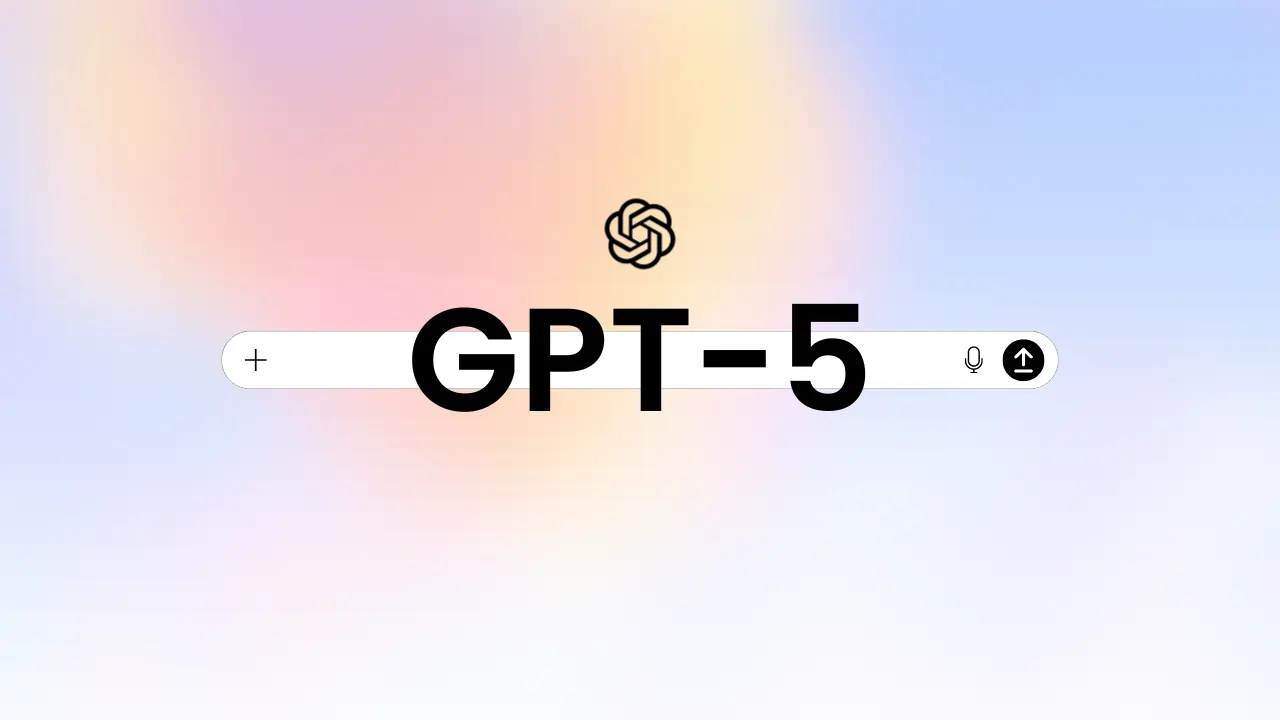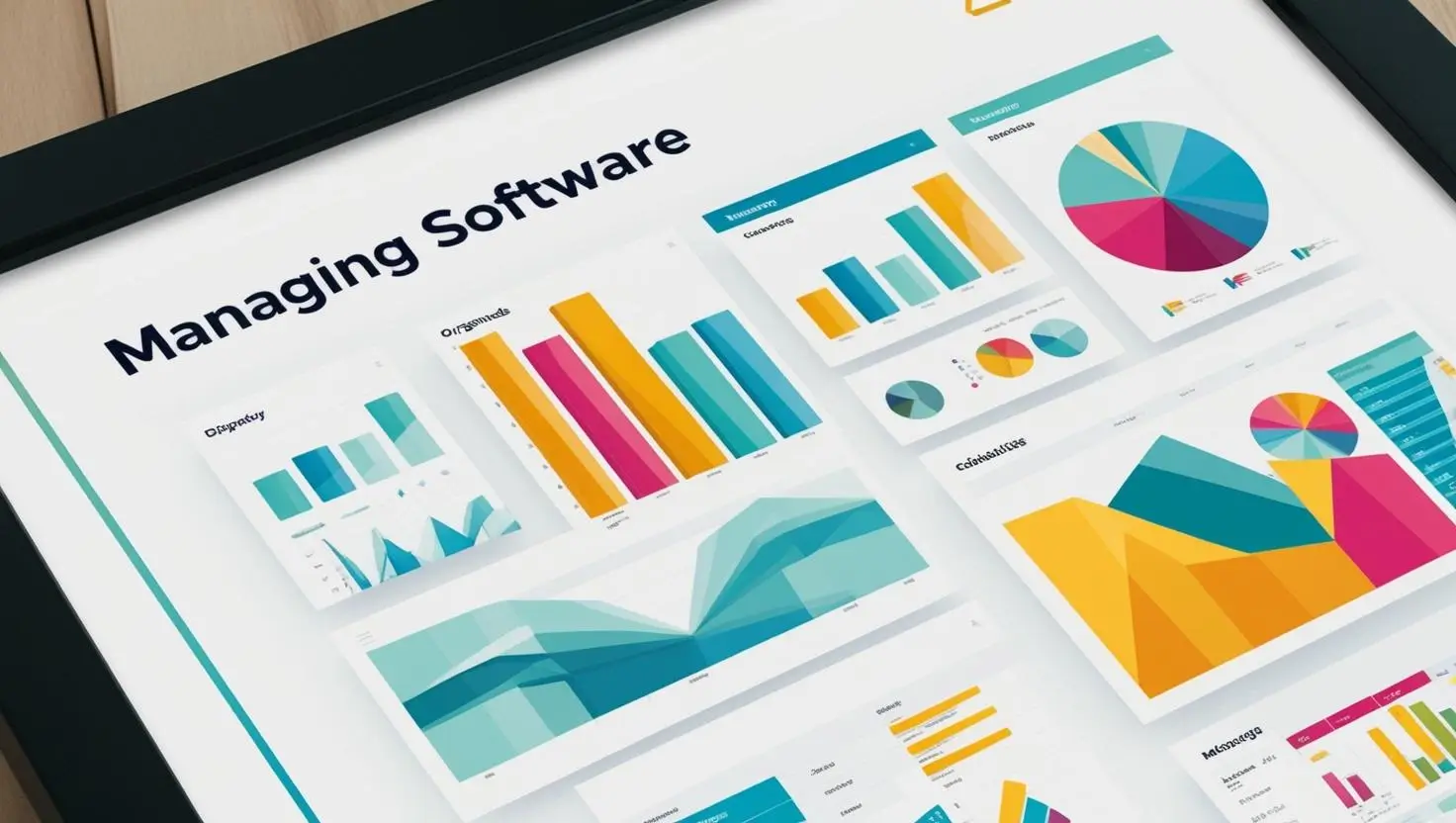Best AI Tools for Marketing in 2025
Last updated: September 2025
AI marketing tools leverage artificial intelligence to automate and optimize marketing and content tasks, enhancing strategy and execution. By analyzing data at scale, these tools predict customer behavior, personalize marketing messages, and optimize content across channels. This results in increased efficiency, higher conversion rates, and accelerated business growth. These tools include data analytics tools, AI chatbots for customer engagement, AI writing tools, AI image generators and editors, and AI video generators and editors. Let’s compare the best AI marketing tools for your business needs.
- Custom templates: Blogs, articles & social
- Plagiarism Checker: Protect your reputation
- Real-time teamwork to edit & refine copy
- Mash up multiple landscapes & swap skies
- Change your age, expression, or pose
- Facial recognition for quality alterations
- Web-based and user-friendly AI tool
- Broad settings to tailor generated images
- Generative AI fill and expand tools
- Make prototype with AI
- Automate your work with Plugins & Widgets
- AI Image Generator
- Readability score for intended audience
- Plagiarism checker against 1B+ web pages
- Context-aware content corrections
- Easily integrate apps into custom chatbots
- Use AI-powered 24/7 customer support
- Generate leads with automation
- Apply data & analytics to your content
- Robust security to protect sensitive data
- Performance prediction & copy intelligence
- Built-in collaboration tools for teams
- SEO capabilities for search engines
- Real-time suggestions & style adjustments
- Elevate SEO with keyword integration
- Translate & localize for global audiences
- Extensive features & mobile friendly
- Built-in fact-checking and citation tools
- Boost your writing skills & efficiency
- Formal, casual, humorous, or informative
- Real-time suggestions, edits & generation
- AI-powered document & email summarizations
- AI-made emails & PowerPoint presentations
- Modify or expand existing images
- Create different variations of images
- Mimics a wide range of artistic styles
What Are AI Marketing Tools and What Do They Do?
AI marketing tools are sophisticated software solutions that leverage artificial intelligence (AI) to improve marketing strategies, content, and operations. By automating routine tasks, such as content posting and email campaigns, these tools free up time for marketing teams to focus on strategic initiatives. Additionally, they excel in analyzing vast amounts of data, enabling marketers to glean deep insights into customer behaviors and preferences. This aids in more informed decision-making and enhances the ability to tailor marketing efforts to specific target audiences.
These tools also offer advanced personalization by customizing messages and content for individual users based on their interaction history and preferences. Predictive analytics further empower marketers by forecasting future consumer behaviors and market trends, allowing for real-time campaign optimizations.
Moreover, AI facilitates content creation, from text to visuals, maintaining consistent brand messaging across channels. Overall, AI marketing tools streamline marketing processes, boost creativity, and optimize both campaign performance and customer engagement, driving significant business growth.
 Built-in collaboration tools for teams
Built-in collaboration tools for teams  SEO capabilities for search engines
SEO capabilities for search engines  Elevate SEO with keyword integration
Elevate SEO with keyword integration  Translate & localize for global audiences
Translate & localize for global audiences  Readability score for intended audience
Readability score for intended audience  Plagiarism checker against 1B+ web pages
Plagiarism checker against 1B+ web pages  Easily integrate apps into custom chatbots
Easily integrate apps into custom chatbots  Use AI-powered 24/7 customer support
Use AI-powered 24/7 customer support  Apply data & analytics to your content
Apply data & analytics to your content  Robust security to protect sensitive data
Robust security to protect sensitive data Types and Features of AI Marketing Tools Available
AI tools for digital marketing encompass a broad range of technologies tailored to various marketing functions. These tools collectively enhance marketing efficiency, effectiveness, and personalization, contributing to better customer experiences and faster business growth. Here’s a breakdown of the types of the best marketing AI tools available:
Content Creation Tools
Content creation tools efficiently create diverse and engaging content, ensuring that all creative outputs are high-quality and aligned with strategic marketing goals.
AI Writing Tools
These include tools such as ChatGPT, Claude AI, and Copilot AI.
- Tone and Style Consistency: Ensure all generated content matches the brand’s voice across different platforms.
- Multi-Format Adaptability: Capable of producing content suitable for blogs, social media, emails, and more, adapting seamlessly to each format’s requirements.
- Content Enhancement Suggestions: Offer suggestions to improve existing content for greater effectiveness and engagement.
- Language Variety: Support multiple languages, allowing for global content strategies.
- SEO Optimization: Integrate keywords naturally to enhance search engine rankings without compromising readability.
AI Image Generators and Editors
These include creative masters such as Midjourney, Dall-E, and Adobe Firefly.
- Image Creation from Text: Generate detailed, high-resolution images from simple text descriptions.
- Brand Consistency: Automatically adjust images to adhere to specific brand guidelines like color schemes and styling.
- Rapid Prototyping: Allow for quick visual mockups, facilitating faster iterative design processes.
- Scalability: Capable of producing large volumes of images quickly, ideal for large-scale campaigns.
- Editing Precision: Offer tools for fine-tuning images, including cropping, resizing, and color correction using AI recommendations.
AI Video Generators and Editors
These include quick and easy tools such as InVideo and Synthesia.
- Script-to-Video Conversion: Transform written scripts into complete animated videos.
- Automatic Voiceover Synchronization: Integrate and sync voiceovers with video content automatically.
- Contextual Effects and Transitions: Detect the script’s context to apply suitable visual effects and transitions.
- Background Music Integration: Automatically select and integrate background music that complements the video content.
- Brand Alignment in Videos: Ensure all videos adhere to the brand’s visual identity, enhancing brand recognition and consistency.

Customer Interaction Tools
AI customer interaction chatbots — like the ones that pop up on websites asking if you need help — enhance user engagement and satisfaction. They provide tailored experiences and responsive support, ultimately fostering a more personalized relationship between the brand and its customers.
AI Chatbots and Virtual Assistants
These include talkative and almost human-like bots such as ChatGPT, Google’s Gemini, and Jasper.
- 24/7 Customer Support: Offer round-the-clock assistance, ensuring customers can get help whenever they need it.
- Natural Language Processing: Understand and respond to customer inquiries in a natural and conversational manner.
- Multichannel Support: Operate across various platforms like websites, social media, and messaging apps, providing consistent service.
- Learning and Adaptation: Improve responses over time by learning from past interactions to handle inquiries more effectively.
- Integration with Backend Systems: Can retrieve information from CRM systems, order management, and more to provide comprehensive support.
Personalization Engines
These include targeting tools such as Adobe Target, Optimizely, and Dynamic Yield.
- Behavioral Tracking: Analyze user actions and behaviors on websites and apps to tailor experiences.
- Dynamic Content Customization: Change content in real-time based on user preferences and behaviors, such as suggesting products or adjusting layouts.
- A/B Testing: Continuously test different versions of website elements to determine which versions perform better for different user segments.
- Predictive Personalization: Anticipate user needs based on past behavior and modify the user experience accordingly.
- Segmentation and Targeting: Categorize users into distinct groups for more targeted and effective marketing messages.
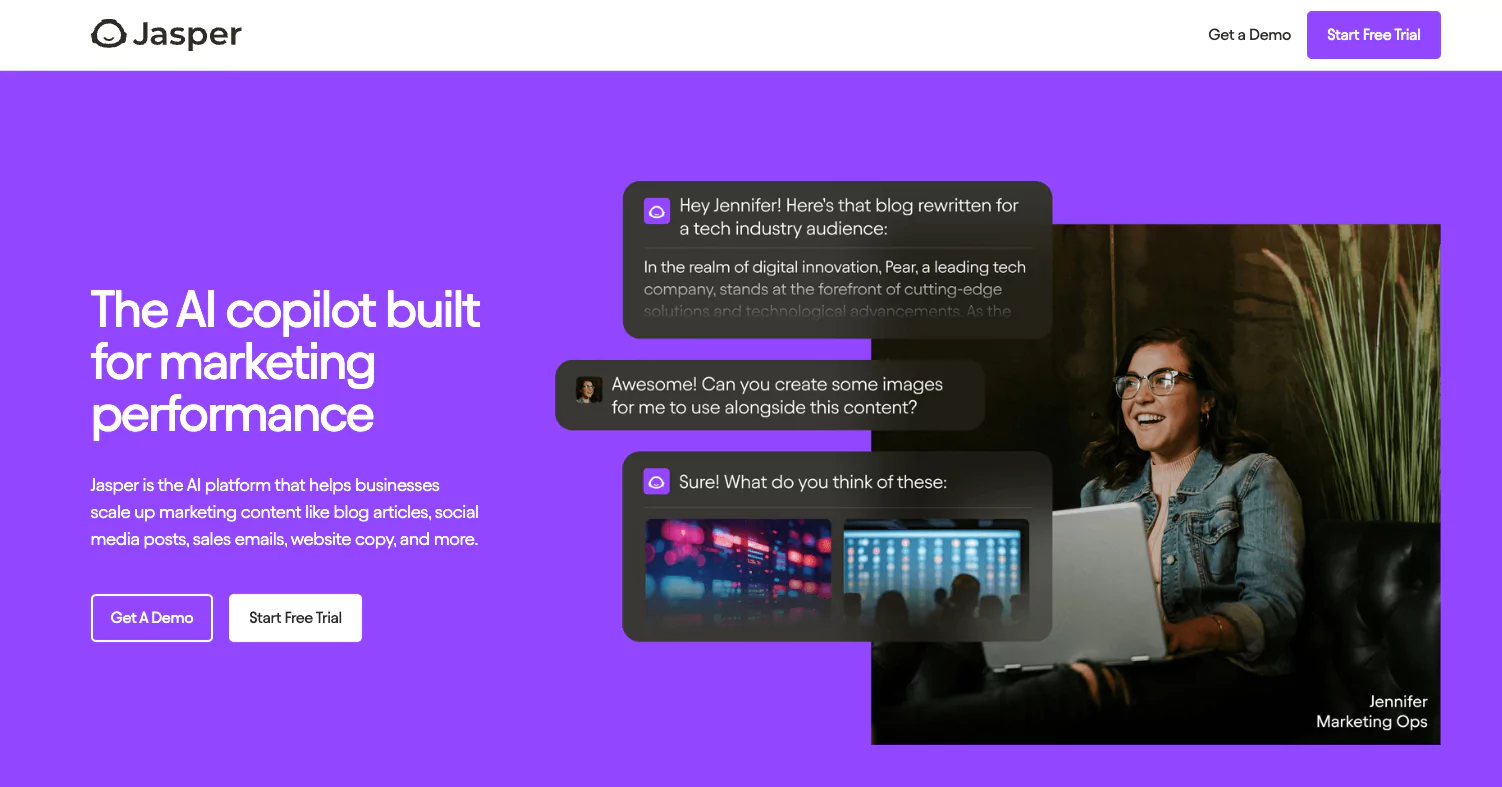
Analytics and Data Insights
These AI-driven analytics and data insight tools provide deep and actionable insights that can significantly improve the effectiveness of marketing campaigns. They allow companies to be more agile in their marketing efforts, adapting quickly to consumer needs and market changes.
Tableau, IBM Watson Analytics, and SAS Visual Analytics are great analytics tools that incorporate AI capabilities.
Chatbots like ChapGPT also have research capabilities. They collect data from online sources and present it in graphs and tables.
Predictive Analytics
- Trend Forecasting: Utilize machine learning to analyze historical data and predict future trends, helping marketers anticipate market shifts and consumer preferences.
- Behavior Prediction: Identify patterns in customer behavior to forecast future actions, enabling proactive marketing strategies.
- Demand Forecasting: Predict future product demand, assisting in inventory management and marketing planning.
- Risk Assessment: Evaluate potential risks in marketing strategies based on predicted market conditions.
Customer Segmentation Tools
- Dynamic Segmentation: Automatically categorize customers into groups based on behavior, demographic data, and purchase history, allowing for highly targeted marketing.
- Real-time Segmentation Updates: Adjust customer segments in real-time as new data is collected, ensuring marketing efforts are always targeted to the right group.
- Personalized Marketing Campaigns: Facilitate the creation of customized marketing messages tailored to the needs and preferences of different segments.
Sentiment Analysis
- Emotion Detection: Use natural language processing to identify and assess the emotions expressed in customer feedback and social media, helping brands understand customer sentiments.
- Trend Identification in Public Opinion: Monitor changes in sentiment over time to spot trends and react accordingly in marketing strategies.
- Contextual Analysis: Go beyond basic sentiment (positive, negative, neutral) to understand the context and nuances of customer opinions, enhancing response strategies.
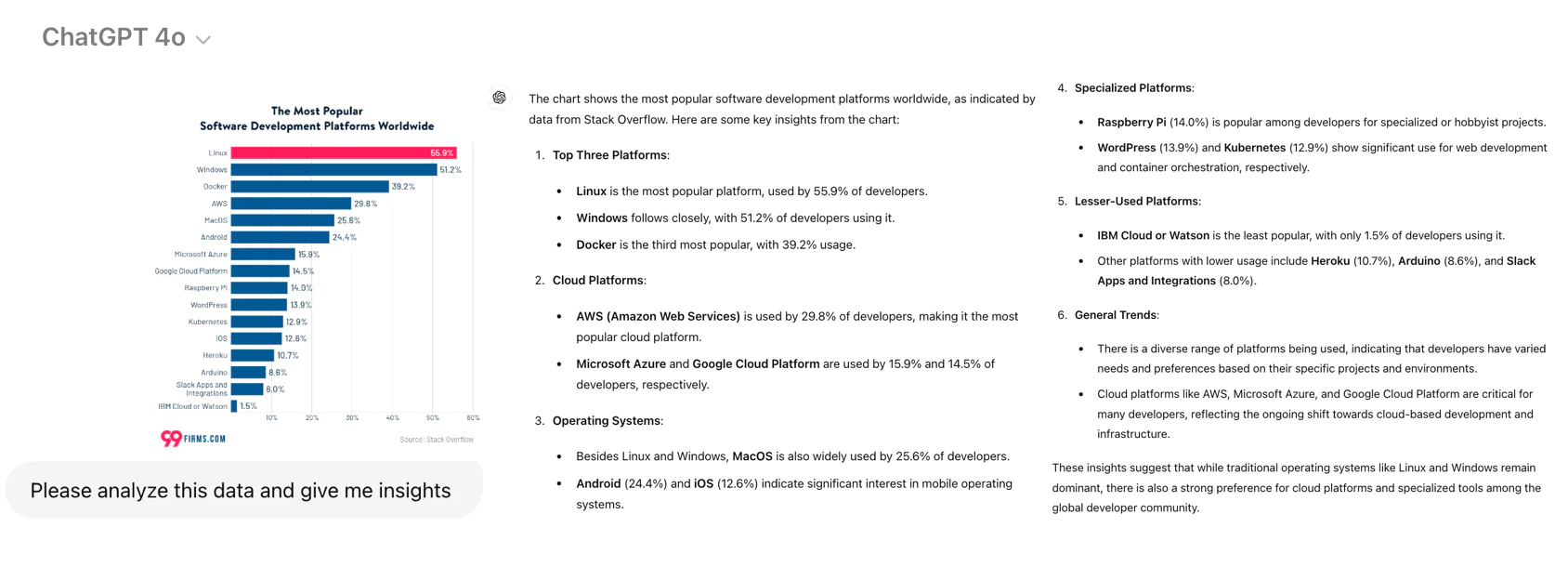
Growth Prediction
AI tools for market research and growth prediction empower businesses to forecast and respond effectively to future challenges and opportunities. By providing a clear picture of expected performance across key metrics, these tools help marketers proactively adapt strategies, ensuring sustained growth and competitiveness.
These tools include IBM Cognos Analytics, Oracle Business Intelligence, and Microsoft Power BI, but these insights can also be accessed by AI chatbots such as Google’s Gemini.
KPI Forecasting
- Visitor Number Predictions: Analyze historical data and current trends to predict future website traffic, helping marketers optimize engagement strategies and server resources.
- Conversion Rate Forecasting: Use predictive analytics to estimate future conversion rates from various marketing channels, enabling businesses to refine their funnel strategies for better results.
- Revenue Projections: Project future revenue based on past sales data and market conditions, assisting in financial planning and marketing budget allocation.
Strategic Adjustment Capabilities
- Real-Time Data Utilization: Continuously update predictions based on real-time data, allowing for agile adjustments to marketing campaigns.
- Scenario Planning: Enable marketers to test different strategies in virtual models to see potential outcomes before implementing them in the real world.
- Optimization Suggestions: Offer recommendations for optimizing marketing strategies based on predicted outcomes, aiming to maximize efficiency and effectiveness.
Performance Analysis
- Trend Spotting: Identify emerging trends in customer behavior and market conditions, providing early insights for strategic planning.
- Impact Analysis: Evaluate the potential impact of external factors on KPIs, such as changes in economic conditions or competitor actions.
- Benchmarking: Compare predicted KPIs against industry benchmarks to assess performance and identify areas for improvement.
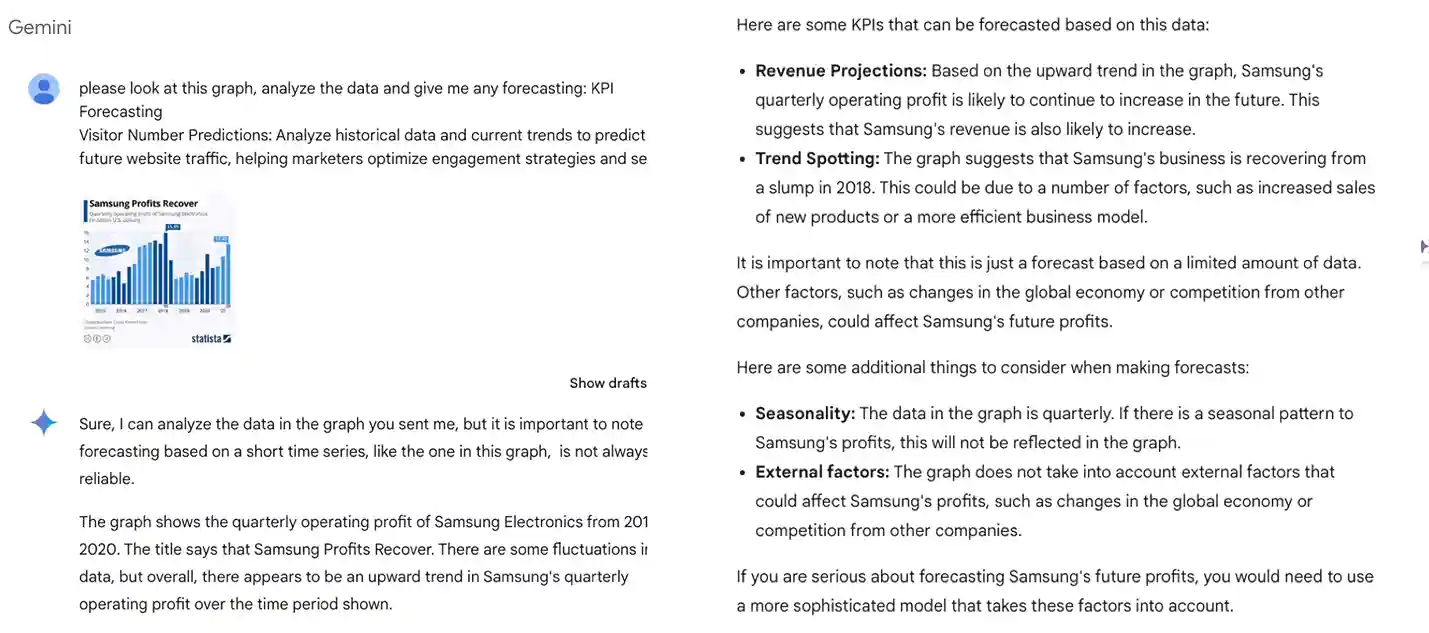
SEO and Content Optimization
AI-driven SEO and content optimization tools streamline the process of improving search rankings and ensure content resonates well with the target audience. By leveraging these tools, marketers can maintain a dynamic and effective online presence, continuously adapting to search engine algorithms and user preferences.
SEO Tools
These include well-known tools such as SEMrush, Ahrefs, and SurferSEO.
- Keyword Optimization: Analyze content to suggest the most relevant and high-impact keywords based on market research, ensuring improved search engine visibility.
- Content Performance Analysis: Monitor how different pieces of content perform in search rankings and provide actionable insights to enhance visibility.
- On-Page Optimization Recommendations: Guide on structuring content, such as title tags, meta descriptions, and header tags, to optimize for search engines.
- SEO Trend Alerts: Keep marketers updated with the latest SEO trends and algorithm updates, ensuring strategies remain effective.
- Backlink Analysis: Evaluate the quality and quantity of backlinks to aid in building a stronger SEO profile.
Content Curation Tools
Companies offering these features include Curata and Feedly, but of course, you can always rely on your favorite chatbots, like ChatGPT, Copilot AI, and Jasper.
- User Interaction-Based Recommendations: Dynamically suggest content to users based on their past interactions and engagement, personalizing their experience.
- Engagement Analytics: Measure how curated content performs, providing insights into user preferences and behaviors.
- Automated Content Distribution: Ensure content reaches the right audience segments at optimal times across various platforms.
- Content Refreshing: Identify older content that can be updated or repurposed to maintain relevance and interest.
- Thematic Curation: Group content into themes or topics based on user interest data, enhancing discoverability and engagement.
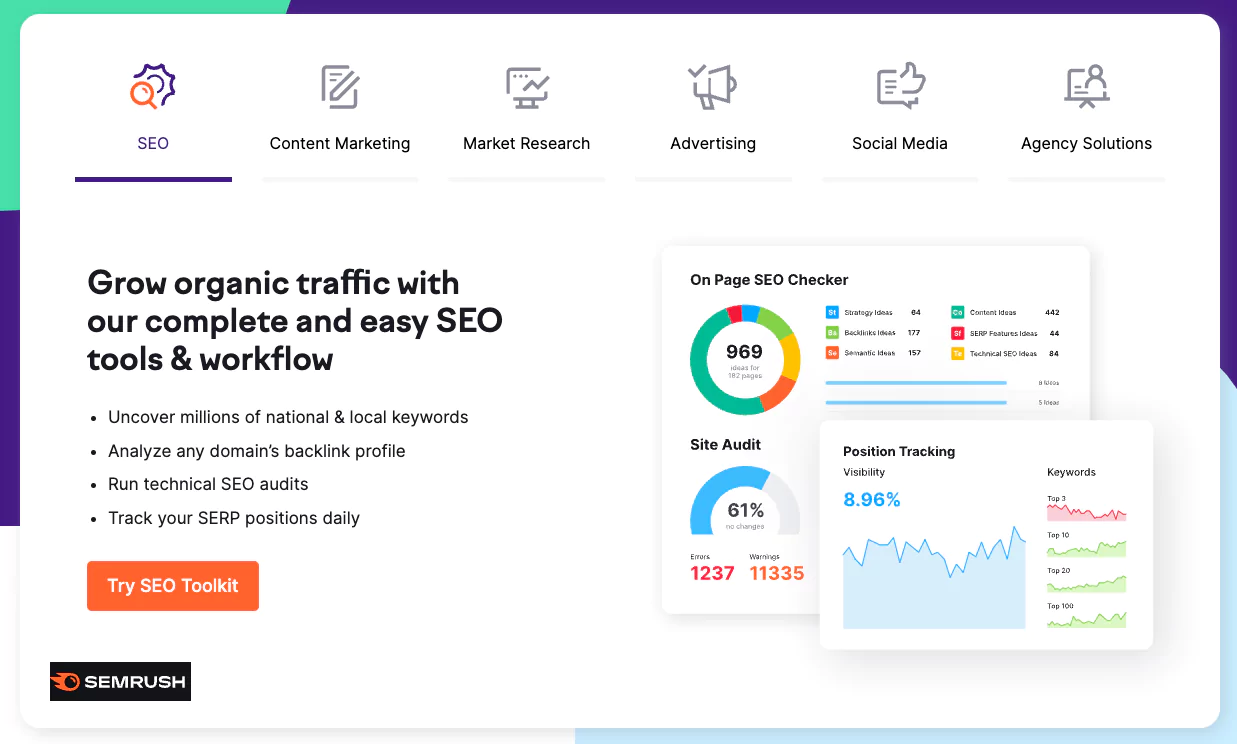
Email Marketing Automation
AI-driven email marketing automation tools provide a robust framework for personalizing communication, optimizing engagement, and measuring the effectiveness of email campaigns. These tools enable marketers to deliver tailored content at the most impactful times, significantly improving the chances of conversion and customer retention.
Automated Email Campaigns
These tools include HubSpot, Brevo, and SendGrid.
- Behavior-Triggered Emailing: Send personalized emails automatically based on specific user actions, such as site visits, cart abandonment, or previous purchases.
- Dynamic Content Personalization: Tailor the marketing content of emails to match the interests and past behavior of each recipient, enhancing relevance and engagement.
- A/B Testing Automation: Automatically test different versions of email campaigns to determine the most effective elements, from subject lines to call-to-action buttons.
- Customer Lifecycle Management: Send targeted emails at different stages of the customer journey, from onboarding to retention, ensuring appropriate messaging throughout.
Email Optimization Tools
These include HubSpot, Brevo, and GetResponse.
- Send Time Optimization: Analyze user behavior to determine the optimal time to send emails, maximizing open and click-through rates.
- Content Adaptation: Modify email content in real time based on ongoing data analysis to better resonate with recipients at any given moment.
- Engagement Predictions: Predict how different segments will react to email campaigns, allowing for pre-emptive adjustments to maximize effectiveness.
- Campaign ROI Analysis: Provide detailed insights into the return on investment for each email campaign, helping marketers allocate resources more effectively.
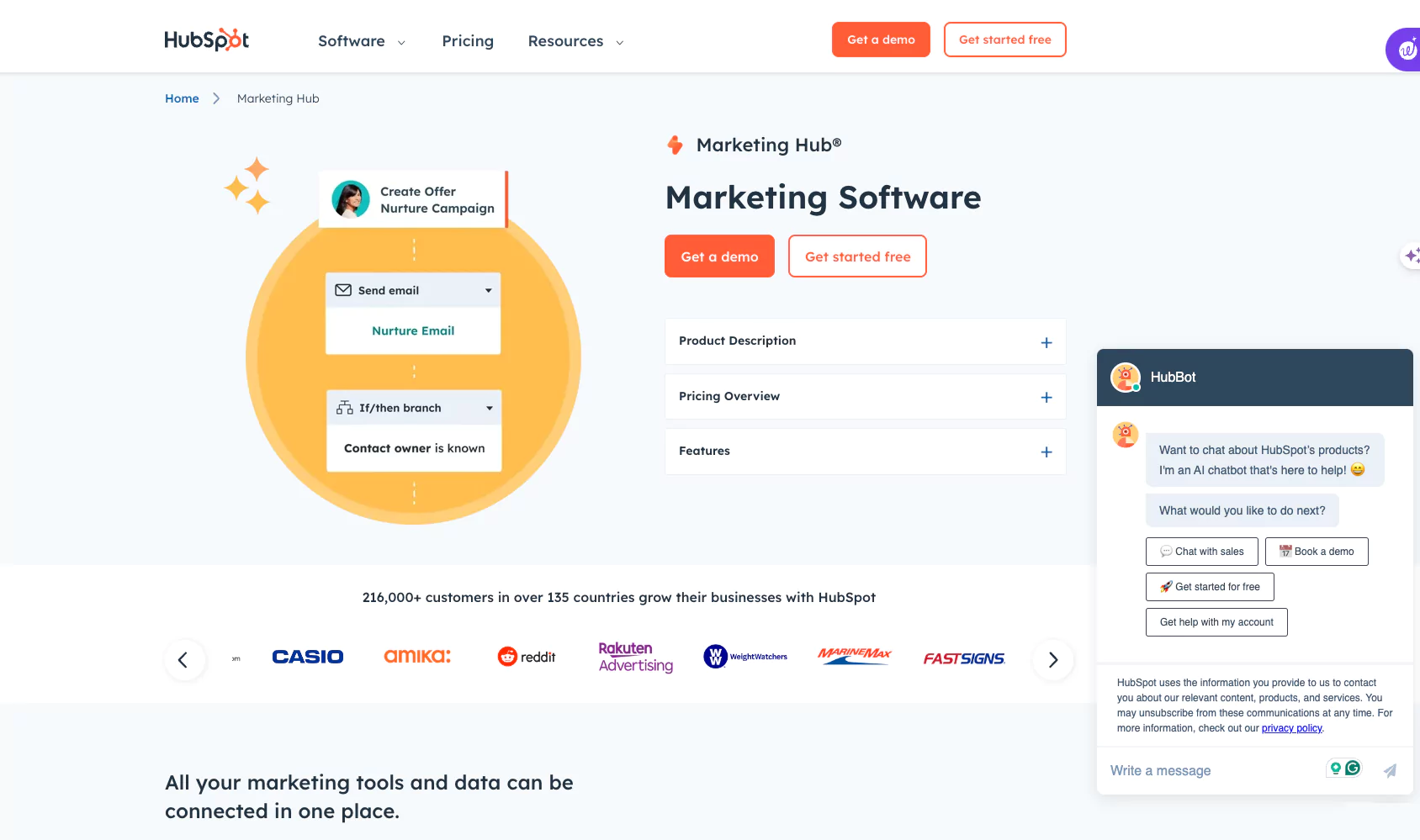
Sales and CRM Automation
These AI-enhanced sales and CRM automation tools streamline lead and customer management processes but also bring a level of personalization and predictive accuracy that traditional systems can’t match.
By leveraging AI, businesses can enhance their sales and marketing strategies, improve customer relationships, and ultimately drive more successful outcomes.
Lead Scoring and Management
Software such as Salesforce, HubSpot, and Zoho incorporate AI capabilities, but Zapier has a built-in chatbot that optimizes these functions.
- AI-Driven Scoring: Utilizes machine learning algorithms to assess and score leads based on their activity, engagement, and demographic data, indicating their likelihood to convert.
- Prioritization Automation: Automatically ranks leads, enabling sales teams to focus their efforts on those most likely to close, improving efficiency and conversion rates.
- Behavioral Analysis: Monitors and analyzes lead behaviors over time to refine scoring models and predictions, ensuring up-to-date and accurate prioritization.
- Integration with Marketing Campaigns: Coordinates lead scoring with ongoing marketing campaigns to tailor interactions based on lead status and interest level.
AI-Driven CRM Systems
Salesforce, Freshsales, and Zoho CRM leverage AI capabilities to enhance their products and offerings.
- Predictive Customer Insights: Analyze customer data to forecast future behaviors and needs, allowing sales teams to address concerns and opportunities proactively.
- Automated Interaction Management: Manages routine customer interactions through AI, freeing up human agents to handle more complex queries and issues.
- Personalization at Scale: Customizes communications and recommendations for each customer based on their unique profile and history, enhancing satisfaction and loyalty.
- 360-Degree Customer Views: Compiles comprehensive profiles of each customer by integrating data across various touchpoints, providing a complete view that facilitates better service and engagement.
Integration with Automation Platforms
- Workflow Automation: Connects CRM systems with other business tools through platforms like Zapier, automating workflows and data transfer across applications.
- Trigger-Based Actions: Set up conditional actions in CRM that trigger corresponding processes in other tools, ensuring seamless operations and data consistency.
- Enhanced Data Accessibility: Makes it easier for sales and marketing teams to access and utilize data from CRM systems in other applications, improving response times and decision-making accuracy.
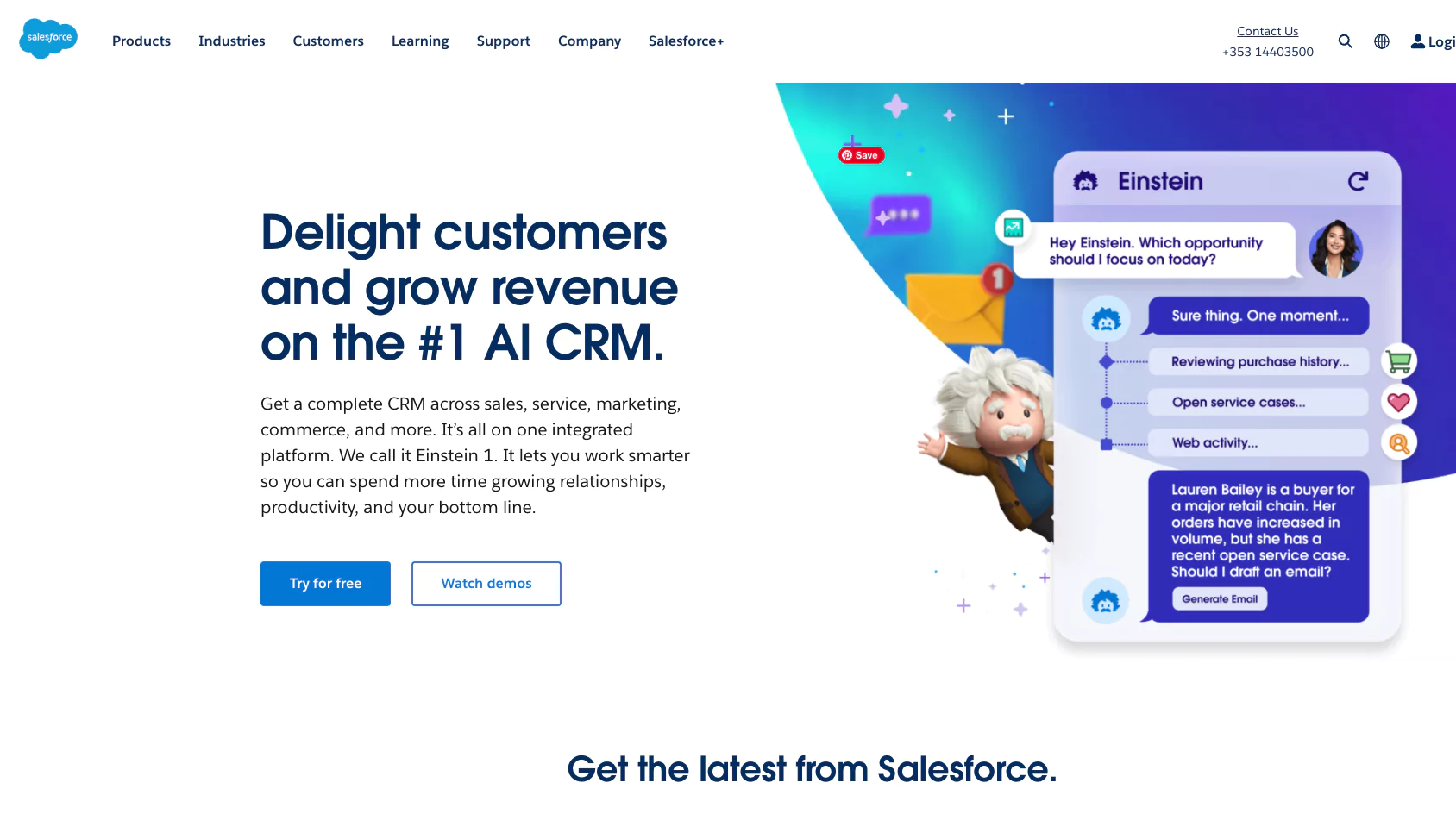
Do I Really Need AI Marketing Tools?
AI tools for marketing are becoming essential for any business that wants to stay ahead of the curve. These tools bring several significant benefits that can transform your marketing efforts and help your business grow.
- Time-Saving Capabilities: Automate repetitive tasks such as marketing content creation, email dispatch, and ad management, freeing up your team for more creative and strategic pursuits.
- Deep Audience Insights: Utilize AI to delve into consumer data, predicting trends and personalizing marketing to anticipate customer needs effectively.
- Enhanced Customer Engagement: Tailor marketing messages for higher personal relevance, boosting engagement and fostering customer loyalty.
- 24/7 Operation: AI chatbots provide round-the-clock personalized support, ensuring continuous campaign optimization and lead retention.
If you’re aiming for more efficient, insightful, and personalized marketing, then AI tools are the way to go. They make your marketing smarter, your team happier, and your business more successful.
The Average Pricing of AI Marketing Tools
The cost of AI marketing tools can range widely, typically influenced by the depth of features and the scale of operations they support.
While free tools offer a cost-effective way to introduce AI into your marketing strategy, they often lack the capabilities needed for larger, more detailed campaigns.
Although premium tools are more expensive, they provide a wide range of advanced features and scalability, making them a worthwhile investment for businesses looking to enhance their marketing effectiveness comprehensively.
Free Versions:
- Pros:
- Cost-effective: Absolutely no financial outlay.
- Trial Opportunity: Ideal for testing the waters with AI technologies.
- Cons:
- Limited Features: Basic functions with usage limitations.
- No Customer Support: Lack of dedicated support can hinder issue resolution.
Premium Versions:
- Price Range: Prices for small-scale solutions can start as low as $50 per month and can go up to $5,000 per month or more for enterprise-grade capabilities.
- Pros:
- Advanced Features: Extensive analytics, deep customization, and broad integration options.
- Scalability: Designed to accommodate business growth and complex marketing strategies.
- Customer Support: Comprehensive support for troubleshooting and optimization.
- Cons:
- Higher Cost: While offering more, the high price can be a significant investment, particularly for smaller businesses.
- Learning Curve: The complexity of the tools may require considerable training.
How to Choose the Right AI Marketing Tools for You
Choosing the best AI tools for digital marketing is crucial for marketing teams and content creators aiming to enhance their strategies and output. When selecting AI tools, it’s essential to consider several factors to ensure they meet your specific marketing needs and can efficiently support your creative processes. Here’s what to consider:
-
Alignment with Marketing Goals
Ensure that the AI tools you are considering align with your specific marketing objectives. Whether you need support in automating content production, enhancing customer interactions, or optimizing ad campaigns, the tool should directly contribute to achieving these goals. -
Functionality and User Experience
Evaluate the features of the AI tools, such as content generation capabilities, data analytics, and customer segmentation. The interface should be intuitive and user-friendly, facilitating seamless integration into your existing marketing processes and aligning with the team’s technical skills. -
Integration and Support
Consider how well the AI tools integrate with your current marketing stack and digital platforms. Adequate support, including customer service and troubleshooting resources, is vital to ensure you can utilize the tool effectively and resolve any issues swiftly. -
Data Security and Compliance
Data security is paramount in marketing. Choose AI tools that adhere to stringent data protection standards and comply with relevant marketing regulations to ensure the safety of your and your customers’ data. -
Flexibility and Customization
Evaluate the flexibility of the AI tools in terms of customization options. Tools that allow customization can be tailored to meet your specific marketing needs better and more easily adapt to changes in your strategy. -
Cost-Effectiveness
Assess the value the AI tool offers compared to its cost. Consider both the upfront costs and the potential ROI from increased efficiency and improved campaign results. Make sure the pricing model fits within your budget and is scalable as your marketing needs evolve. -
Continuous Improvement and Updates
Opt for AI tools that are regularly updated with the latest advancements in AI technology and marketing practices. This ensures the tool remains effective and up-to-date, continuously supporting your marketing strategies as industry standards evolve. -
Scalability
The tool should be capable of scaling up to accommodate growing marketing needs or campaigns without degradation in performance, ensuring it can support your team as it expands. -
Trial Periods and Demos
Take advantage of trial periods and demos to test AI marketing tools before making a purchase. This allows your team to assess firsthand whether the tool’s features align with your workflows and integrate smoothly with your existing systems. -
Reviews and Case Studies
Research what other companies and users say about the tools you’re considering. Look for reviews and case studies that demonstrate how these tools have impacted similar marketing efforts. This can provide valuable insights into the tool’s effectiveness and reliability. -
Training and Educational Resources
Check if the tool provider offers comprehensive training and educational resources. Effective training materials can help your team quickly master the tool, maximizing its value and ensuring you get the most out of your investment. -
Ethical Considerations
Consider the ethical implications of using AI in your marketing efforts. Ensure that the tools you choose use AI responsibly, maintain transparency in how data is used and processed, and promote fair and unbiased marketing practices.
Related Products That Integrate With AI Marketing Tools
When implementing the best AI tools for digital marketing, considering products that integrate seamlessly with them can significantly enhance their functionality and effectiveness. This allows organizations to create a more synchronized, data-driven, and effective marketing ecosystem that leverages AI capabilities across all aspects of their digital marketing strategy.
Here’s a list of related product categories that integrate with AI marketing tools, ensuring a cohesive and efficient marketing technology stack:
Customer Relationship Management (CRM) Systems
- Integration Benefits: Syncing AI marketing tools with CRM systems allows for deeper data analysis and personalization, enabling targeted marketing strategies based on comprehensive customer profiles.
- Examples: Salesforce, HubSpot, Pipedrive
Content Management Systems (CMS)
- Integration Benefits: Integrating AI tools with CMS systems can automate content creation and optimization, ensuring that content is both SEO-friendly and tailored to the audience’s preferences.
- Examples: WordPress, Wix, Web.com
E-commerce Platforms
- Integration Benefits: Integrating AI with e-commerce platforms can personalize shopping experiences, recommend products, and optimize inventory based on predictive analytics.
- Examples: Shopify, Wix eCommerce, BigCommerce
Social Media Management Platforms
- Integration Benefits: These platforms can use AI to schedule posts, analyze social media traffic, and optimize engagement strategies across multiple channels.
- Examples: Hootsuite, Buffer, Sprout Social
Email Marketing Platforms
- Integration Benefits: AI enhances email marketing platforms by automating email personalization, optimizing send times, and segmenting audiences based on behavior and preferences.
- Examples: Mailchimp, Constant Contact, Campaign Monitor
Data Analytics and Business Intelligence Tools
- Integration Benefits: AI tools can feed into these platforms to provide deeper insights into marketing performance, customer journeys, and ROI analysis.
- Examples: Tableau, Google Analytics, Adobe Analytics
Advertising Platforms
- Integration Benefits: AI can optimize ad spend and targeting strategies on these platforms, enhancing the effectiveness of ad campaigns and improving cost-efficiency.
- Examples: Google Ads, Facebook Ads Manager
Marketing Automation Platforms
- Integration Benefits: These platforms benefit from AI by automating complex campaign workflows, scoring leads, and providing actionable insights to drive conversions.
- Examples: Marketo, Pardot, Eloqua
Final Thoughts
As artificial intelligence develops at light speed, it’s clear that the right AI marketing tools can transform your marketing strategies from good to exceptional.
Whether you opt for the best AI marketing tools on the market or start with free AI tools for marketing, the key is to choose solutions that integrate well with your existing tech stack and align perfectly with your business goals.
From enhancing content creation to optimizing customer interactions and automating tedious tasks, these AI tools are indispensable for anyone looking to excel in today’s digital landscape.
The best AI for marketing isn’t just about automation — it’s about creating more meaningful, personalized interactions that drive engagement and growth.
So, dive in, explore your options, and embrace AI’s potential to revolutionize your marketing efforts.
FAQ
Q: What are AI marketing tools?
A: AI marketing tools use artificial intelligence to automate and optimize marketing tasks, helping businesses improve efficiency and personalize customer interactions.
Q: Can I try AI marketing tools for free?
A: Yes, many providers offer free versions or trial periods, allowing you to test the tool’s capabilities before committing to a purchase.
Q: Which AI marketing tool is best for small businesses?
A: The best AI tool varies based on specific needs, but many small businesses start with free or low-cost options that offer basic automation and data analysis capabilities.
Q: How do AI marketing tools integrate with other software?
A: AI marketing tools can integrate with various platforms, such as CRM systems, email marketing platforms, and social media management tools, enhancing data sharing and workflow efficiency.
